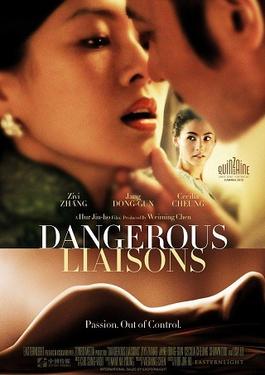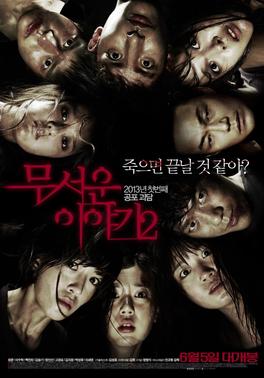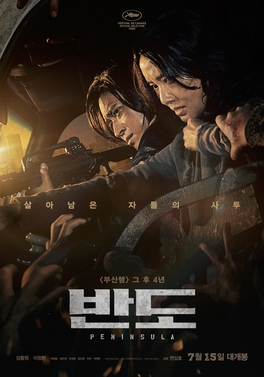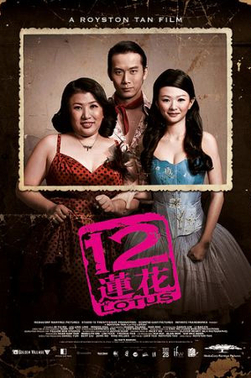
Despite having a flourishing Chinese and Malay film industry in the 1950s and 1960s, Singapore's film industry declined after independence in 1965. Film production increased in the 1990s, which saw the first locally-produced feature-length films. There were a few films that featured Singaporean actors and were set in Singapore, including Saint Jack, They Call Her Cleopatra Wong and Crazy Rich Asians.

Eric Khoo Kim Hai is a Singaporean film director and producer who is often credited for the revival of the Singapore modern film industry.

15 is a 2003 Singaporean coming-of-age black comedy-drama film about teenage gangsters in the Singapore suburbs. Directed by Royston Tan, the film is an expanded version of Tan's 2002 award-winning short film, also titled 15. It is one of the few Singaporean films to feature brief full-frontal male nudity, together with the Singaporean-Thai film Pleasure Factory and the Singaporean-Hong Kong film Bugis Street.

Royston Tan is a Singaporean filmmaker and actor.
Lionel Chok Ko Hon is a Singaporean film-maker and director. His documentary, Geraldine, was premiered at the New York International Independent Film & Video Festival. His other short films were also screened in New York City and Singapore. Since completing the Intensive Directing Workshop at New York University, he has written the telemovie Dirty Laundry.

Singapore Dreaming is a 2006 Singaporean drama film. It follows the Loh family, a typical Singaporean working-class family, through their aspirations and dreams for a better and affluent life and the reality that would make it difficult for them to fulfill these aspirations.

Ad-lib Night is the third film by South Korean director Lee Yoon-ki. A group of boys from the country who have come to Seoul to find the runaway daughter of a dying man to be with him on his death bed. The film, based on a short story by Japanese writer Azuko Taira, debuted at the 11th annual Pusan International Film Festival as well as 57th Berlin International Film Festival.

Tan Pin Pin is a Singapore-based film director. She is best known for the documentary film Singapore GaGa (2005). It was the first Singaporean documentary to have a theatrical run. In 2014, her documentary To Singapore, With Love (2013) was denied for all ratings by the Media Development Authority, effectively banning it in Singapore.

881 is a 2007 Singaporean musical-comedy-drama film written and directed by Royston Tan, based on the Singapore getai scene. It is the second Singaporean film that has been released in Japan.
Kelvin Tong Weng Kian is a Singaporean film director, screenwriter and producer. He was a former film critic for The Straits Times.
The Teochew Family is a 1995 Singaporean television series produced by Television Corporation of Singapore and Fujian TV. The series follows the trials and tribulations of the Teochew Cai Family under the patriarch Cai Qingyang, portrayed by Kenneth Tsang, from the late 1940s to the 1990s. The series also starred Zoe Tay, Chew Chor Meng and Zeng Huifen,
Screen Singapore was a film festival in Singapore held from 1 August 2005 to 31 August 2005, on the occasion of the 40th anniversary of the independence of Singapore, to celebrate the heritage of Singaporean cinema from pre-independence days to the present.

Dangerous Liaisons is a 2012 Chinese period romance drama film by Hur Jin-ho loosely based on the 1782 novel with the same title by Pierre Choderlos de Laclos. The novel has been adapted numerous times, including Les Liaisons dangereuses, an adaptation by Roger Vadim (1959), the eponymous Hollywood film (1988), Valmont (1989), Cruel Intentions (1999), and Untold Scandal from South Korea (2003).
Boo Junfeng is a Singaporean filmmaker. Boo's films, Sandcastle (2010) and Apprentice (2016) have been screened at the Cannes Film Festival, beginning with his debut film, Sandcastle, which was an Critics' Week nominee.

Horror Stories 2 is a 2013 horror omnibus film made up of four episodes by four South Korean directors. It screened at the Puchon International Fantastic Film Festival and Sitges Film Festival in 2013, and won the Silver Raven prize in the International Competition at the 2014 Brussels International Fantastic Film Festival.

Young & Fabulous is a 2016 Singaporean cosplay-themed and coming of age film directed by Michael Woo and Joyce Lee. It stars Aloysius Pang, Joshua Tan, Joyce Chu, Gurmit Singh, Henry Thia, Quan Yi Fong, Jeffrey Xu and Jordan Ng. The film was released in Singapore, Malaysia, Indonesia and Vietnam.

Peninsula is a 2020 South Korean post-apocalyptic action horror heist film co-written and directed by Yeon Sang-ho. It is a standalone sequel to the 2016 film Train to Busan, the second live-action feature film and the third overall installment in the Train to Busan film series. The plot follows a former soldier who is sent along with a team to retrieve a truck full of money from the wastelands of South Korea, now inhabited by zombies, rogue militia, and a family. The film stars an ensemble cast featuring Gang Dong-won and Lee Jung-hyun.

24 is a 2021 Singaporean art house film directed by Royston Tan, starring James Choong.

12 Lotus is a 2008 Singaporean musical drama film written and directed by Royston Tan, starring Qi Yuwu, Liu Lingling and Mindee Ong. The film was released in theatres on 14 August 2008 and was screened at the 13th Busan International Film Festival in October 2008. The film performed poorly at the local box office, grossing S$983,000 against a budget of S$$1.5 million.














